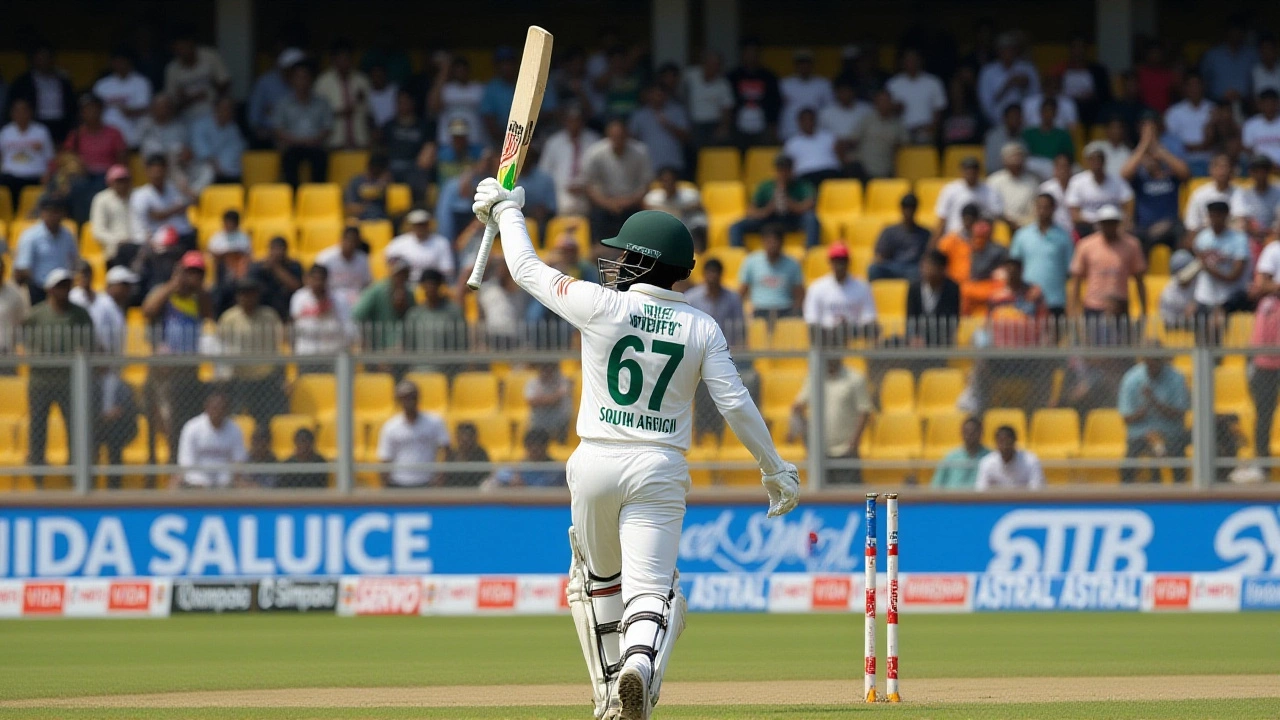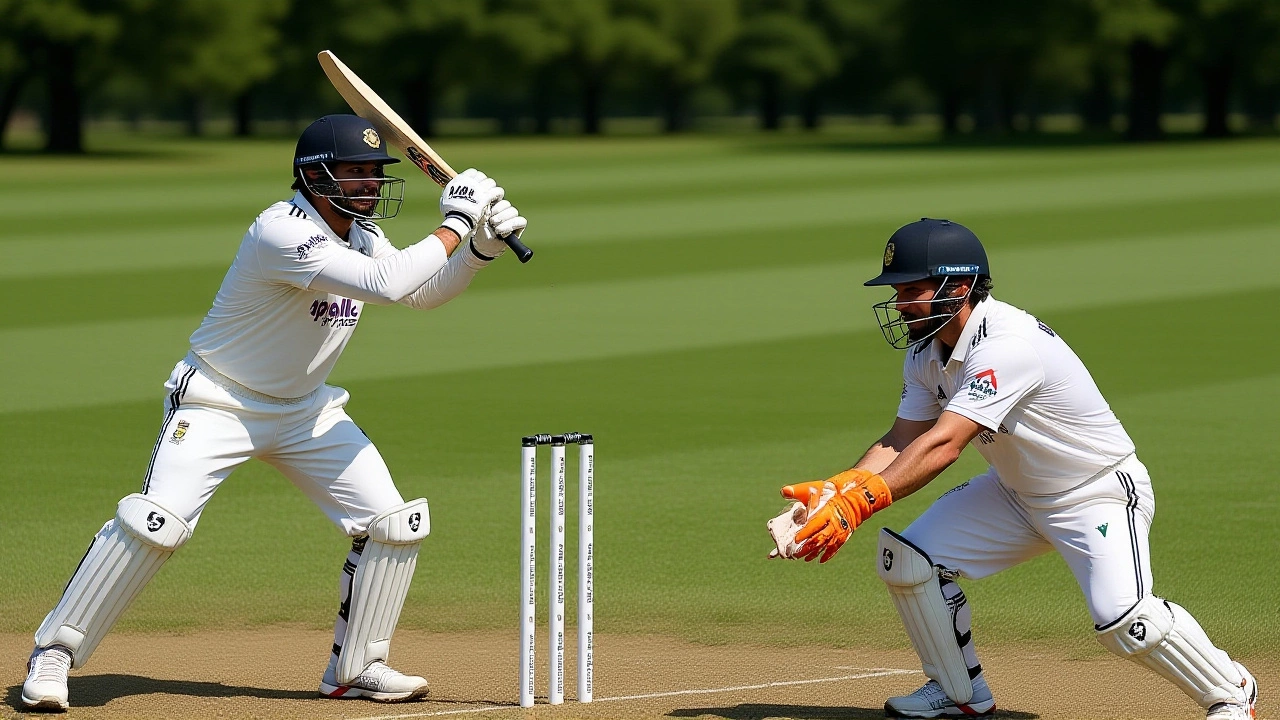Senuran Muthusamy Hits Maiden Test Century as South Africa Dominates India in Guwahati
 Nov, 24 2025
Nov, 24 2025
When Senuran Muthusamy drove a delivery through cover point for four at 3:47 PM IST on Wednesday, November 23, 2025, the crowd at the Assam Cricket Association Stadium erupted—not just for the boundary, but for history. The 31-year-old all-rounder had just notched his first Test century: 109 runs from 187 balls, 12 fours and a towering six, lifting Cricket South Africa to a commanding 357 in their first innings against India. It was more than a personal milestone. It was the spark that turned a tight contest into a potential series-defining moment in the 2025 Freedom TrophyGuwahati. And it happened in a place no one expected: the brand-new Test venue in northeast India, where the first international match had barely begun.
A Century in the Making
Muthusamy, born in Durban on January 12, 1994, didn’t come into this match as a star. He’d played just six Tests since his debut against India in Pune in October 2019, often shuffled between roles as a batting all-rounder and a backup spinner. His highest score before Guwahati? 74. But this innings was different. He didn’t just survive—he dominated. Facing a disciplined Indian attack led by Jasprit Bumrah and Ravindra Jadeja, Muthusamy played with calm authority, using his compact technique to punish loose deliveries and rotate strike with precision. His 109 wasn’t flashy, but it was textbook. And it came at a time when South Africa had lost two early wickets and were struggling at 42 for 2.Guwahati: A Historic Stage
The Assam Cricket Association Stadium in Barsapara, Guwahati, opened its gates to Test cricket for the first time on November 22, 2025. With a 40,000-seat capacity and a pitch offering early assistance to pacers, it was a bold move by the Board of Control for Cricket in India to bring top-tier cricket to a region that hadn’t hosted an international match since 2018. The significance wasn’t lost on local fans. Children waved flags made from old saris. Elderly men, who’d never seen a Test match live, sat in the stands with tears in their eyes. For South Africa, it was an unexpected advantage: India’s home advantage diluted by unfamiliar conditions and a crowd more curious than partisan.South Africa’s Dominance
Muthusamy’s innings was the centerpiece, but not the whole story. South Africa’s 357 was built on disciplined batting and sharp fielding. Kagiso Rabada, returning from injury, ripped through India’s top order with 4 for 64, including the key wickets of Virat Kohli and Shreyas Iyer. Keshav Maharaj added 3 for 78, exploiting the slow turn on Day 3. India, bowled out for 245, looked out of sync. Their captain, Rohit Sharma, made a gritty 57 but lacked support. The 112-run lead was South Africa’s largest in India since 2010.
Historic Firsts
Muthusamy became the 15th South African to score a Test century against India—and the first left-hander to do it on Indian soil since 2000. He’s also the first South African to score a century in his seventh Test match since AB de Villiers in 2005. For a player often overlooked in favor of flashier names, this was a quiet revolution. And it came at a time when South Africa’s Test team has been under pressure: they haven’t won a series in India since 2007, under Graeme Smith. A loss in this series would mean their worst run in India in over two decades.What’s Next: Mumbai Decider
The series now hinges on the third and final Test, starting November 29 in Mumbai. South Africa needs a win to level the series 1-1. India, having won the first Test by 95 runs in Dharamsala, will be desperate to seal it. But momentum has shifted. Muthusamy’s century has given South Africa belief. If they can enforce the follow-on in Mumbai—or even hold India under 250 in their second innings—they could become the first South African side to win a Test series in India since 2007. That’s not just a sporting achievement. It’s legacy.
Behind the Scenes
No one from the team gave a post-match interview. No quotes from coach Shukri Conrad or captain Temba Bavuma appeared in the reports. But the silence spoke volumes. In the dressing room, players reportedly hugged Muthusamy without saying a word. The weight of the moment didn’t need words. His wife, who flew in from Durban, was seen crying quietly in the stands. His mother, watching from home on a grainy livestream, posted a single photo on Facebook: a picture of him as a 10-year-old, holding a cricket bat taller than he was. The caption? “This is my boy.”Frequently Asked Questions
How significant is Senuran Muthusamy’s century for South African cricket?
It’s one of the most important individual performances by a South African batsman in India this century. Muthusamy became the first left-handed South African to score a Test century against India since 2000, and only the 15th overall. For a player who’d been on the fringes of the team, this century could secure his place in the Test side for years to come, especially with South Africa’s middle order still finding stability after the retirements of de Villiers and Faf du Plessis.
Why is the Assam Cricket Association Stadium important?
It’s the first international Test venue in Northeast India, a region historically underrepresented in cricket infrastructure. The BCCI’s decision to host a Test here is part of a broader push by India’s Ministry of Development of North Eastern Region to boost sports and tourism. The 40,000-seat stadium, built in 2024, now joins a short list of venues like Guwahati that signal India’s commitment to expanding cricket beyond its traditional hubs.
What’s the Freedom Trophy, and why does it matter?
The Freedom Trophy is awarded to the winner of the Test series between South Africa and India. It has no monetary value but immense historical weight, symbolizing the rivalry between two nations with deep cricketing roots. First contested in 2019, it’s named to honor the shared struggle for democracy and equality. South Africa has never won it on Indian soil, making this series their best chance since 2007.
Has South Africa ever won a Test series in India?
Only once—back in 2007, under Graeme Smith’s captaincy. That series ended 2-1 in South Africa’s favor, with centuries from Jacques Kallis and AB de Villiers. Since then, they’ve lost five consecutive series in India, including 2010, 2015, 2018, 2021, and 2023. Winning this one would be a landmark achievement, breaking a 17-year drought and rewriting modern South African cricket history.
What’s next for Senuran Muthusamy?
He’s likely to retain his spot in the Test side for the Mumbai decider on November 29. His performance has silenced critics who questioned his selection over younger talents. If he scores another 50 in Mumbai, he could become the first South African to score twin centuries in a series against India since Jacques Kallis in 2004. Beyond this series, his all-round potential—especially his handy off-spin—could make him a fixture in the Test lineup for the next three years.
Why didn’t anyone quote Muthusamy after his century?
South Africa’s team culture, under coach Shukri Conrad, prioritizes quiet professionalism over post-match theatrics. Players often avoid interviews after big performances to stay focused on the next challenge. Muthusamy’s silence wasn’t indifference—it was discipline. His celebration was in the way he raised his bat slowly, looked toward the stands, and then walked straight to the dressing room. That’s the kind of quiet confidence that wins series.